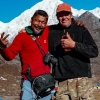Upon your arrival at Tribhuvan International Airport in Kathmandu, our team at Adventure Metro Everest will be ready to greet you. You'll be transferred to your hotel, and after a short break, you can explore the vibrant streets of Thamel, known as Trekkers' Paradise. The first night of your adventure will be spent at your hotel in Kathmandu.
Day two begins with a hotel breakfast and check-out. We'll then transfer you to the national airport for a scenic flight to Lukla. Upon arrival, you'll meet our porter team, and the trek to Phakding will commence. Descending towards the Dudh Khosi River, you'll follow its banks and cross a suspension bridge to reach Phakding. Dinner and an overnight stay at the lodge or tea house await.
The third day involves a trek to Namche Bazaar. After breakfast, you'll traverse pine forests, passing through Zam Phute and Tok Tok villages. The trail leads to Benkar and Monjo, where permits are checked. Entering Sagarmatha (Everest) National Park, you continue to Jorsalle and ascend until reaching Namche Bazaar, the largest Sherpa village in the Everest region. Dinner and an overnight stay at the lodge or tea house follow.
On day four, an acclimatization hike around Namche Bazaar and Khumjung awaits. After breakfast, the acclimatization hike takes you to Syangboche's airstrip and further to the Everest View Hotel, offering the first views of Mt Everest. You can also visit the Everest Photo Gallery and the Sherpa Culture Museum. An optional hike to Khumjung and Kande Villages is available before returning to Namche Bazaar for dinner and an overnight stay.
Day five involves a trek to Tengboche. After breakfast, you'll head to the highest point of Namche Bazaar, continue towards Kyangjuma, and trek through pine forests steeply ascending to Pungki Thanka. Following the right side of the Dudh Koshi River, you'll ascend further to Tengboche. Explore the region's oldest and largest monastery before dinner and an overnight stay at the lodge or tea house.
The sixth day starts with a trek to Dingboche. After breakfast, you'll descend to Deboche village, head for the Imja Valley by crossing the Imja Khola River, and continue towards Pangboche. Following the trail right to Dingboche, you'll enjoy views of Mt Lhotse, Ama Dablam, and Island Peak before dinner and an overnight stay at the lodge or tea house.
Day seven includes an acclimatization hike to Nagarsang Peak. After breakfast, the acclimatization hike takes you up Nagarsang Peak, where you can enjoy views of the surrounding Himalayas. Hiking back to Dingboche, you can explore around the village before dinner and an overnight stay.
The eighth day kicks off with a trek to Lobuche. After breakfast, you'll follow the trail to Thukla and Pheriche, head on rugged paths to Chupki Lhara, and descend down the moraine of the Khumbu Glacier. Crossing the moraine, you'll descend further to Lobuche before dinner and an overnight stay at the lodge or tea house.
Day nine involves a trek to Gorakshep and a hike to Everest Base Camp. After breakfast, you'll make your way up alongside the Khumbu Glacier, reach Gorakshep village, and check in to the lodge or tea house. Hiking further up to Everest Base Camp, you'll celebrate your achievement and enjoy the views before hiking back to Gorakshep. An optional evening hike up to Kala Patthar for a sunset view is available before dinner and an overnight stay.
Day ten starts with a sunrise view at Kala Patthar and a trek to Pheriche. With an early wakeup call, you'll hike up to Kala Patthar hill for a stunning sunrise view, head back to Gorakshep for breakfast, and start the trek following the same route up to Pheriche. Explore around Pheriche village before dinner and an overnight stay at the lodge or tea house.
On day eleven, you'll trek back to Namche Bazaar. After breakfast, retrace your steps back, exit the Imja Valley, pass by Tengboche, and reach back at Namche Bazaar for dinner and an overnight stay.
Day twelve involves a trek back to Lukla. After breakfast, you'll make your way back to Monjo and Phakding, ascend up to Lukla, and check in to the lodge or tea house. An optional celebration with the team is available before dinner and an overnight stay.
Day thirteen includes a flight back to Kathmandu and a transfer to your hotel. After breakfast and check-out, you'll fly back to Kathmandu. Our team will pick you up and transfer you back to your hotel. A trip review and evening celebration dinner follow, with an overnight stay at your hotel, marking the end of the trip.
On day fourteen, after breakfast and check-out, our team will transfer you back to the airport approximately 3 hours before departure. Adventure Metro Everest hopes you enjoyed the Everest Base Camp trek of 14 days and wishes you a pleasant journey onwards.
Last November I traveled to Nepal to visit the remote area of Kanchenjunga. I'm from Spain and did the Kanchenjunga circuit (North and South base camps) with my Indian friend. After many mails sent to...

Well..my Everest Trek with Adventure metro Everest travels was a life time experience. Good guides..team work and well managed..Highly recommend this team for wonderful Everest experience..!!

It was amazing going on the Everest trek, that was organised by Metro Everest Travel. The views were great and the group was too. The guides/porters went above and beyond to make sure we all had the best and safest time. I can't recommend this company enough.
My son had used this company for Everest base camp and recommended to me so when I visited Kathmandu they sorted out all my excursions. I cannot recommend highly enough, I used them for all my trips, The drivers and guides they used were all excellent and Milan could not be more helpful. Would not use anyone else, they really look after you. Very reasonable prices too.
I been using metro Everest severel times during last year and I can only recommend their swift service and friendly hospitality.
Marvel at breathtaking vistas of some of the world's tallest peaks, including Mt Everest, Mt Lhotse, Island Peak, Mt Cho Oyu, Mt Nuptse, Mt Ama Dablam, and Mt Pumori.
Headwear:
Beanie/Warm Hat/Balaclava
Buff/Neck Gaiter
Sun Hat
Sunglasses
Torso:
Thermal Shirts/Underwear x2
Nightwear Thermals (optional x1)
Fleece or Softshell Jacket x1
Down Jacket (provided if needed) x1
Wind/Rain Jacket x1
Day-Wear Shirt: T-shirts or sun shirts x2
Lower Body:
Trekking Pants x1-2
Rain Pants x1
Socks: 5x Hiking socks (various thicknesses) (thin for hot days and thick for cold)
Boots: Comfortable, supportive trekking boots
Camp Shoes: Sandals or flip-flops x1
Down Pants (optional x1)
Accessories:
Ear Plugs
Gloves
Trekking Poles
Reusable Water Bottle: At least 1L capacity
Headtorch
Toiletries
Towel, lightweight (optional)
Sunscreen and Lip Balm
First Aid Kit (provided but clients are encouraged to pack an individual small aid kit)
Personal medication and prescriptions*
Phone/Camera (in a waterproof pouch)
Powerbank and charging cords
Money Belt/Travel Pouch
Sleeping Bag: Down-filled, 3-season, or 4-season depending on region (provided if needed)
Sleeping Bag Liner: Cotton, silk, or fleece (provided if needed)
Cash for personal expenses, snacks, tips, and miscellaneous costs that may incur
Put everything in a waterproof liner in the rucksack (provided if needed)
*Please note that our guides are not qualified to offer any medical advice. If you need to use any medication, including Diamox (commonly used for altitude sickness), we advise that you seek guidance from a medical professional before departure.
The best time to embark on the Everest Base Camp Trek is during the pre-monsoon (March to May) and post-monsoon (September to November) seasons when the weather is generally clear, and the views are stunning.
Yes, the Everest Base Camp Trek is suitable for trekkers with a moderate level of fitness. While it involves some steep ascents and descents, technical climbing skills are not required, making it accessible to a wide range of people.
Trekkers need to obtain the TIMS (Trekkers' Information Management System) card and the Sagarmatha National Park entry permit for the Everest Base Camp Trek. These permits can be obtained in Kathmandu or Lukla before starting the trek.
Accommodation along the Everest Base Camp Trek route includes teahouses, guesthouses, and basic lodges in villages along the trail. These accommodations provide simple but comfortable rooms and meals, offering a cozy place to rest after a day of trekking.
Everest Base Camp is located at an altitude of approximately 5,364 meters (17,598 feet) above sea level, providing trekkers with breathtaking views of the surrounding Himalayan peaks.
Altitude sickness can be a concern during the Everest Base Camp Trek, especially as trekkers ascend to higher altitudes. It's important to acclimatize properly, stay hydrated, and be aware of symptoms of altitude sickness.
